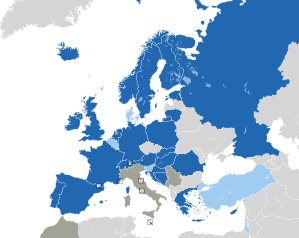
Back مسابقة الأغنية الأوروبية 1994 Arabic 1994 Avroviziya Mahnı Müsabiqəsi Azerbaijani Конкурс песні Еўрабачанне 1994 Byelorussian Евровизия 1994 Bulgarian Eurosong 1994. BS Festival de la Cançó d'Eurovisió 1994 Catalan Eurovision Song Contest 1994 Danish Eurovision Song Contest 1994 German Διαγωνισμός Τραγουδιού Eurovision 1994 Greek Eŭrovido-Kantokonkurso 1994 Esperanto
| Eurovision Song Contest 1994 | |
|---|---|
 | |
| Dates | |
| Final | 30 April 1994 |
| Host | |
| Venue | Point Theatre, Dublin, Ireland |
| Presenter(s) | Cynthia Ní Mhurchú Gerry Ryan |
| Musical director | Noel Kelehan |
| Directed by | Patrick Cowap |
| Executive supervisor | Christian Clausen |
| Executive producer | Moya Doherty |
| Host broadcaster | Radio Telefís Éireann (RTÉ) |
| Website | eurovision |
| Participants | |
| Number of entries | 25 |
| Debuting countries | |
| Returning countries | None |
| Non-returning countries | |
| |
| Vote | |
| Voting system | Each country awarded 12, 10, 8-1 point(s) to their 10 favourite songs |
| Winning song | "Rock 'n' Roll Kids" |
The Eurovision Song Contest 1994 was the 39th edition of the Eurovision Song Contest, held on 30 April 1994 at the Point Theatre in Dublin, Ireland. Organised by the European Broadcasting Union (EBU) and host broadcaster Radio Telefís Éireann (RTÉ), and presented by Cynthia Ní Mhurchú and Gerry Ryan, the contest was held in Ireland following the country's victory at the 1993 contest with the song "In Your Eyes" by Niamh Kavanagh. It was the first time that any country had hosted two successive editions of the contest, following the previous year's contest held in Millstreet.
Twenty-five countries participated in the contest, which for the first time featured a relegation system to reduce the number of interested participating countries. Seven new countries participated in the event, with entries from Estonia, Hungary, Lithuania, Poland, Romania, Russia and Slovakia featuring for the first time. However, Belgium, Denmark, Israel, Luxembourg, Slovenia and Turkey were unable to compete due to the new relegation rules as the lowest-scoring countries at the previous event, whereas Italy decided against participating by choice.
For the third time in a row, Ireland won the contest with the song "Rock 'n' Roll Kids", written by Brendan Graham and performed by Paul Harrington and Charlie McGettigan. Never before had a country won 3 times in a row in the history of the contest. At the same time, it was also a record sixth win, cementing Ireland as the country with the most wins in Eurovision history up till that point. Poland, Germany, Hungary and Malta rounded out the top five positions, with Poland achieving the most successful result for a début entry in the contest's history.
The 1994 contest also featured the first appearance of Riverdance. Originally a seven-minute performance of traditional Irish and modern music, choral singing and Irish dancing featured as part of the contest's interval act, it was subsequently developed into a full stage show which has since become a worldwide phenomenon and catapulted the careers of its lead dancers Jean Butler and Michael Flatley.
© MMXXIII Rich X Search. We shall prevail. All rights reserved. Rich X Search
